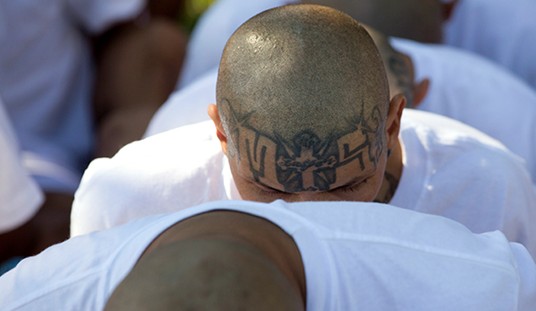A new study of 137 French terrorists found that the jihadists shared “several common denominators including a lower level of education, poorer integration into the labor market, higher levels of criminal activity, and stronger ties to the Maghreb and to sub-Saharan Africa than the average French citizen.”
The report from the Institut français des relations internationales (Ifri), or French Institute for International Relations, also catalogued recruitment trends influenced by group dynamics, the internet, and prisons.
The study also sounded the alarm about recidivism as 60 people convicted of terrorism offenses in France are scheduled to be released from prison within the next two years.
Terrorists behind the attacks on Charlie Hebdo, the Hyper Cacher supermarket, and attacks on police officers shared profile characteristics of being born in France to immigrant families, having a “chaotic educational trajectory,” and significant prior criminal offenses.
About 1,300 French citizens have traveled to ISIS territory, with even more arrested en route. By the end of February 2018, 323 who spent time in Iraq-Syria had returned to France, including 68 minors. Much of the information about terrorists in the study was gleaned from court proceedings of those who faced terrorism charges between 2004 and 2017; most of these terrorists were unknown to the general public.
The study looks at 131 men and six women, though women have comprised about a third of the group leaving France for Syria. The average age among these jihadists at the time of their offenses was 26.
Many of the terrorists came from underprivileged regions of France. Of the 68 for whom educational information was available, 32 had no high school degree. One was an engineer, though, and one was a doctor of particle physics.
Only one of the terrorists had a very high income, which he raked in as a result of selling drugs.
Of the 126 terrorists whose criminal record could be accessed by the researchers, 61 had no prior convictions or tangles with police. Fifteen had been reported to the police, but didn’t have any convictions on their record.
Even though many of the well-known terrorists in France have spent time in prison, only four of the 96 jihadists for whom sentencing information was available spent more than two years behind bars.
Only 37 percent of the 59 jihadist for whom financing data was available got their funds from a jihadist support network. Twenty-seven percent tapped into their personal savings to finance terrorism, 15 percent used funds from their families and 21 percent used illicit funds raised through crime.
“In all cases, the amounts in question were modest, ranging from several hundred to several thousand euros,” noted the report. “We are dealing here with a ‘low-cost’ jihadism, which does not require the setting up of complex financial circuits.”
Nationality data was available for 130 of the terrorists, and 90 of these were French citizens. Twenty-nine were dual citizens, with the other country being Morocco, Algeria or Tunisia. “These statistics confirm a tendency observed in other European countries since the London attacks in 2005: the terrorism affecting France is essentially domestic (‘homegrown terrorism’),” the report adds. “A large majority of the convicted individuals were born in France and grew up there.”
Thirty-five of the terrorists in the study were converts to Islam — they had been mostly Christians and atheists, but also included two Buddhists and one Jew.
French officials who worked with the juvenile terror offenders told Ifri that they had noticed “experiences of the death of close ones and of sexual abuse were particularly common.”
The study also confirmed “low levels of religious knowledge among young people engaged in jihadism,” including one who told the court that the first thing he did upon returning to France “was to crack open a bottle of vodka and smoke some hash.”
“A difference between generations can be observed. In groups sentenced in the first decade of the 2000s, it is sometimes possible to identify members who had spent time in a Muslim country with the goal of studying the Qur’an and, for the non-Arabic speakers, learning Arabic,” the report noted.
One converted to Islam and planned to go to Syria to fight in the span of a month in an effort to attract a woman he liked; that woman later become his wife.
The sample of jihadists in the study didn’t include any true “lone wolves,” as many of the defendants went to high school or played football together, or were neighbors. Some had jihadist links across different generations.
The report also stated that French national Larossi Abballa, who stabbed to death a police officer and his partner at their home in Magnanville, France, in 2016, practiced several years before the attack by slitting the throats of bunnies.
The study concluded that “the recurrence of certain characteristics is strong enough to merit target actions to prevent radicalization,” such as “given the number of unemployed and temporary workers in the sample, we might conclude that unemployment services and temp agencies may have a particular role to play in detecting radicalization.”
“Additionally, targeted work could be done on the internet and particularly on social networks, beginning with looking at the preferences and connections of individuals involved in terrorist cases. A sufficiently refined targeting would make it possible to preserve the balance between security and the respect of individual liberties, without tipping over into a system of mass surveillance.”
“Deradicalization,” the report added, “gets bad press, but experimentation in the field seems necessary” given the number of jihadists poised to soon emerge from prison, because “if these individuals leave prison as radicalized — or more radicalized— than when they went in, we should prepare ourselves for difficult days ahead.”









Join the conversation as a VIP Member